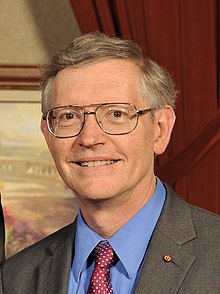William Moerner
| William E. Moerner | |
|---|---|
 |
|
| Born | William Esco Moerner June 24, 1953 Pleasanton, California |
| Residence | American |
| Nationality | American |
| Fields | Chemistry, applied physics, biophysics |
| Institutions | Stanford University |
| Alma mater | Washington University in St. Louis, Cornell University |
| Doctoral advisor | Albert J. Sievers |
| Notable awards |
Wolf Prize in Chemistry (2008) Irving Langmuir Award (2009) Peter Debye Award (2013) Nobel Prize in Chemistry (2014) |
William Esco Moerner (born June 24, 1953) is an American physical chemist and chemical physicist with current work in the biophysics and imaging of single molecules. He is credited with achieving the first optical detection and spectroscopy of a single molecule in condensed phases, along with his postdoc, Lothar Kador. Optical study of single molecules has subsequently become a widely used single-molecule experiment in chemistry, physics and biology. In 2014 he was awarded the Nobel Prize in Chemistry.
Moerner was born in Pleasanton, California, in 1953 June 24 the son of Bertha Frances (Robinson) and William Alfred Moerner. He was a boy scout, with the Boy Scouts of America and became an Eagle Scout. He attended Washington University in St. Louis for undergraduate studies as an Alexander S. Langsdorf Engineering Fellow, and obtained three degrees: a B.S. in physics with Final Honors, a B.S. in electrical engineering with Final Honors, and an A.B. in mathematics summa cum laude in 1975. This was followed by graduate study, partially supported by a National Science Foundation Graduate Fellowship, at Cornell University in the group of Albert J. Sievers III. Here he received an M.S. degree and a Ph.D. degree in physics in 1978 and 1982, respectively. His doctoral thesis was on vibrational relaxation dynamics of an IR-laser-excited molecular impurity mode in alkali halide lattices. Throughout his school years, Moerner was a straight A student from 1963 to 1982, and won both the Dean's Award for Unusually Exceptional Academic Achievement as well as the Ethan A. H. Shepley Award for Outstanding Achievement when he graduated from college.
...
Wikipedia
